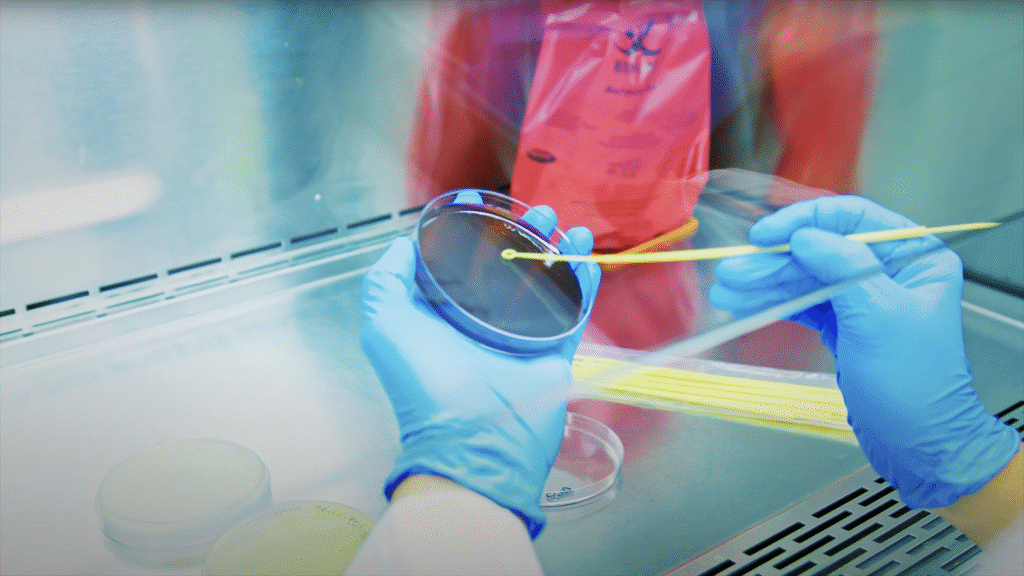McGill University’s Center for Antimicrobial Resistance (AMR) integrates diagnostic, surveillance and prevention, and treatment research to provide real-world solutions to AMR.
Antibiotic resistance occurs when microorganisms such as bacteria, fungi, and parasites become unresponsive to drugs designed to eliminate them, leading to infections that are increasingly difficult to prevent and treat. According to the World Health Organization, in 2023, nearly one in six laboratory-confirmed bacterial infections worldwide will be resistant to antibiotic treatment. This increased resistance increases the risk of disease transmission, prolonged illness, and death, while undermining decades of medical progress. Beyond medicine, AMR poses a widespread challenge, threatening food security, agriculture, and environmental stability.
AMR remains one of the most urgent public health challenges of the 21st century, threatening advances in medicine, food production, and environmental protection. Scientific discoveries alone are not enough to address such complex problems. It requires collaboration, innovation, and real-world application. Because AMR spans many interconnected systems, traditional single-disciplinary research approaches cannot fully address it. A coordinated “One Health” approach that brings together diverse disciplines is essential to developing sustainable solutions.
Translating research into innovation and impact: The McGill AMR Center approach
At McGill University in Canada, researchers at the McGill AMR Center are bridging the critical lab-to-field gap by translating fundamental discoveries into deployable solutions. Through multidisciplinary integration across diagnosis, surveillance and prevention, and treatment, the Center strives to redefine how academic research can generate impactful discoveries and drive innovation to reduce the risks posed by AMR.
The McGill AMR Center serves as a hub for collaborative research and innovation. It brings together more than 60 researchers from McGill University and partner institutions across the faculties of medicine, health sciences, dentistry, agricultural and environmental sciences, law, and engineering. This diverse expertise creates a dynamic environment for addressing AMR from multiple perspectives. Its mission is to translate discoveries made in the lab into real-world solutions to combat AMR. The center supports shared resources such as a severe infectious disease and AMR intensive care unit (ICU) research platform that enables the study of critically ill patients, and a microbial library, a large collection of pathogenic bacteria used to develop new treatments and diagnostics. Additionally, a year-round program of seminars, symposiums, outreach, and training keeps the research community informed and connected. These efforts enable McGill’s AMR Center to drive innovation and reduce the spread of AMR.
Diagnostics: Enhance early detection across your environment
Rapid and reliable diagnostics are critical to identifying resistant pathogens before they spread. At McGill’s AMR Center, researchers are developing next-generation diagnostic platforms that are fast, affordable, and adaptable. These include nanosensor-based technologies, CRISPR-driven molecular assays, and microfluidic biosensors that can detect resistance markers directly from clinical or environmental samples.

These tools are also applied in agricultural and ecological environments, allowing the detection of resistant bacteria in livestock, soil, and wastewater. Portable, field-ready systems provide near real-time data that powers AMR surveillance networks. By combining engineering innovation and biomedical insights, McGill researchers are developing diagnostic tools that enable early intervention and more effective management of AMR.
Surveillance and prevention: Mapping resistance in clinics and other areas
Understanding where and how resistance occurs is essential for prevention. At the AMR Center, researchers study how AMR originates and spreads in hospitals, farms, wastewater systems, and natural ecosystems. Researchers are using genomics, bioinformatics, and environmental monitoring to map resistance pathways that link human activities to broader ecosystems.
McGill researchers are working with government agencies and international partners to help strengthen efforts to monitor AMR. For example, research monitoring bacteria in wastewater near hospitals and in food production is revealing how resistant bacteria spread locally and globally. By combining these findings with computational models, researchers can identify where intervention is most needed and guide strategies to limit the spread of resistant bacteria.
Therapeutics: Redefining the pipeline for next-generation treatments
As traditional antibiotics lose effectiveness and few new antibiotics are developed, McGill researchers are seeking innovative treatment strategies that work in fundamentally different ways. Scientists are using structure-based design, artificial intelligence, and antitoxic approaches to develop treatments that neutralize pathogens without further building microbial resistance.
Researchers at the Center combine expertise in microbiology, infectious diseases, chemistry, structural biology, and biophysics to advance the development of antimicrobial agents and microbiome-targeted candidates through early-stage drug development. Programs like the McGill Innovation Fund (MIF)-AMR foster interdisciplinary collaborations that accelerate preclinical testing, while biosafety level 1, 2, and 3 facilities enable rapid testing and preclinical validation of new compounds. Together, these resources will accelerate antibiotic discovery and strengthen Canada’s ability to deliver effective new treatments.
Collaboration that makes an impact
Addressing antimicrobial resistance requires more than individual breakthroughs. Through initiatives such as the AMR Québec (AMRQ) Network and Can-AMR-Net, the AMR Center is building a research ecosystem by fostering collaboration across academia, government, industry, and public health. The AMRQ Network is a state initiative that brings together 93 members from seven universities, four research institutions, and four government agencies to share expertise, resources, and training on AMR research. Can-AMR-Net is a new national training platform that provides young researchers with interdisciplinary mentorship, practical experience, and opportunities to contribute to advancing Canada’s AMR research capacity.
Beyond these networks, the Center works closely with institutional and external partners to pursue collaborations that accelerate technology development and facilitate the translation of discoveries into practical solutions. This includes collaboration with international providers and consortia involved in AMR diagnostic and treatment research.
The McGill AMR Center welcomes new collaborators and partners to join these efforts. Through international partnerships, diverse expertise, and coordinated efforts, the Center provides a research platform that accelerates the development of new diagnostics, treatments, and prevention strategies to combat AMR locally and globally.
This article will also be published in the quarterly magazine issue 24.
Source link

